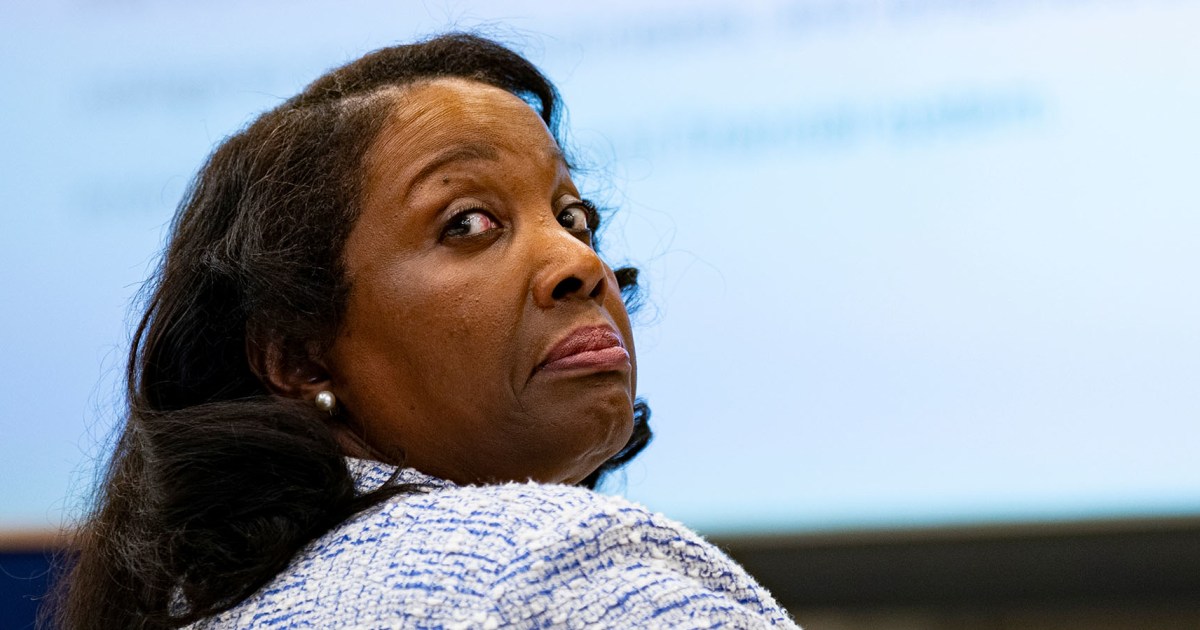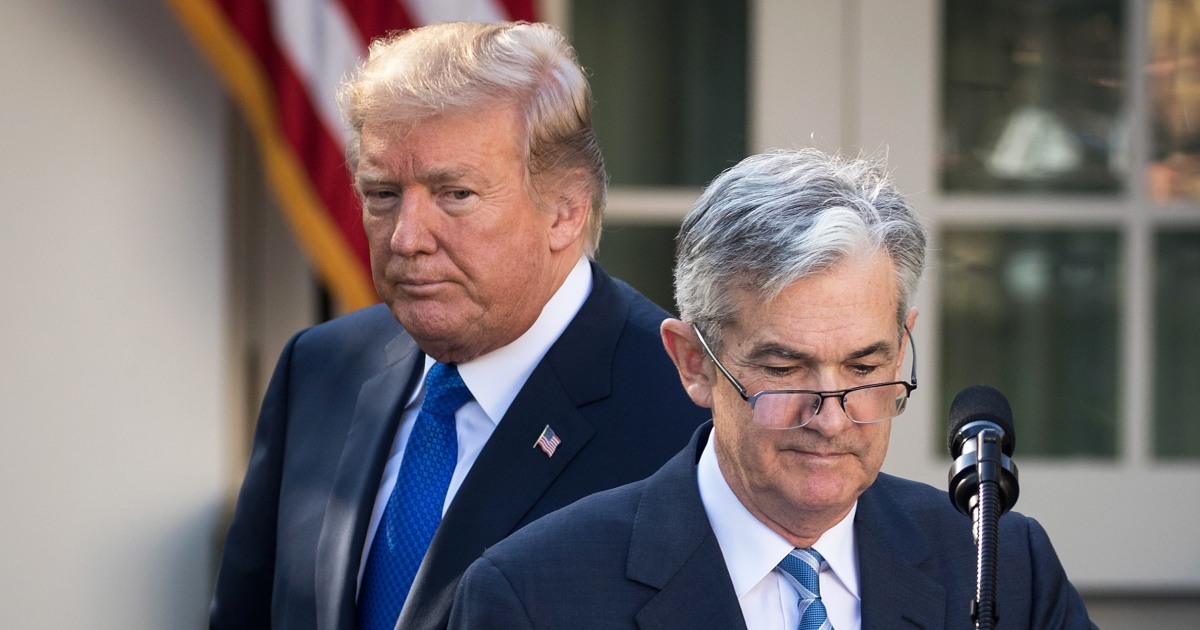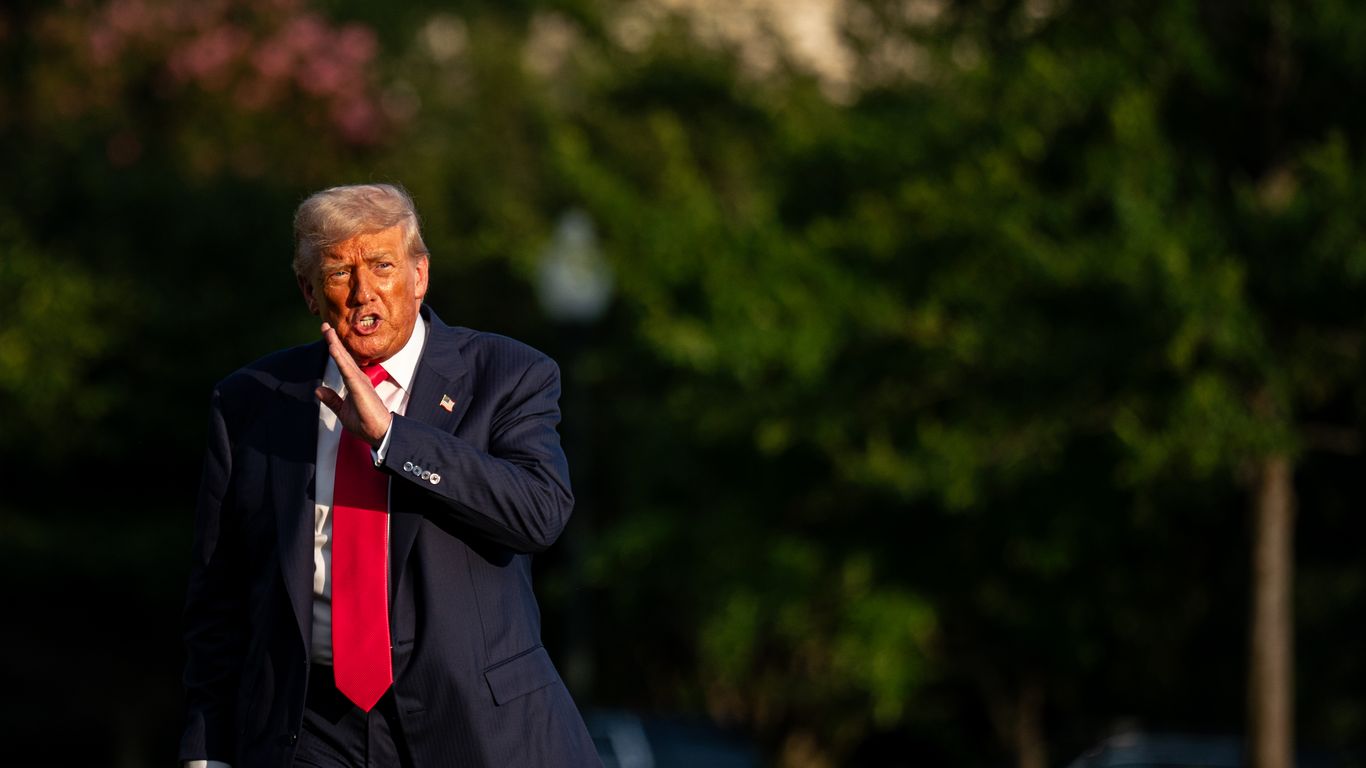Trump Calls for Federal Reserve Governor's Resignation

Introduction
President Donald Trump has once again stirred controversy with his recent comment on Truth Social, where he called for Federal Reserve Governor Lisa Cook's resignation. This came after William Pulte, the director of the U.S. Department of Housing and Urban Development, alleged mortgage fraud by Cook.
Key Details
Cook, who was appointed by President Joe Biden in 2021, has been a vocal advocate for economic policies that benefit low-income and marginalized communities. She has also been a strong supporter of increasing access to affordable housing, which makes Pulte's accusation all the more surprising.
In response to Trump's call for her resignation, Cook has released a statement denying any involvement in mortgage fraud and expressing her commitment to her role at the Federal Reserve. However, the controversy has raised questions about the political influence on the Federal Reserve and its decisions.
Impact
The current situation raises concerns about the independence and integrity of the Federal Reserve, as it is meant to be a non-partisan entity. With Trump's comment, there are fears that Cook's position may be at risk, and it may set a precedent for future political interference in the Federal Reserve's operations.
Moreover, this controversy highlights the importance of having a diverse and unbiased Federal Reserve board, as it plays a crucial role in shaping the country's monetary policies and economy.
Donald John Trump, born June 14, 1946, in Queens, New York, is an American businessman, media personality, and politician. He graduated from the University of Pennsylvania’s Wharton School in 1968 with a degree in economics. In 1971, he took over his family’s real estate business, renaming it the Trump Organization, through which he expanded into building and managing skyscrapers, hotels, casinos, and golf courses. Trump gained widespread fame as the host of the reality TV show *The Apprentice* from 2004 to 2015, which helped establish his public persona as a successful entrepreneur.
Trump entered politics as a Republican and was elected the 45th president of the United States, serving from 2017 to 2021. His presidency was marked by significant policy actions including tax cuts, deregulation, the appointment of three Supreme Court justices, renegotiation of trade agreements (notably replacing NAFTA with the USMCA), and a focus on immigration control including border wall expansion. He withdrew the U.S. from international agreements such as the Paris Climate Accord and the Iran nuclear deal, and engaged in a trade war with China. His administration’s response to the COVID-19 pandemic was criticized for downplaying the virus’s severity. Trump was impeached twice by the House of Representatives—first in 2019 for abuse of power and obstruction, and again in 2021 for incitement of insurrection—but was acquitted by the Senate both times.
After losing the 2020 election to Joe Biden, Trump challenged the results, culminating in the January 6, 2021, Capitol riot. He remains a central figure in American politics, having won the 2024 presidential election and returned as the 47th president in 2025, continuing to promote policies aimed at economic growth, border security, and military strength[1][2][3][4]. Lisa DeNell Cook (born 1964) is an American economist and a member of the Federal Reserve Board of Governors, having assumed office in May 2022 and reappointed in September 2023 for a term ending in 2038. She is notable as the first African American woman to serve on the Federal Reserve Board[1][2][6][8].
Cook holds a BA in Physics and Philosophy from Spelman College, where she was the first Marshall Scholar, and earned a second BA in Philosophy, Politics, and Economics from Oxford University. She completed her Ph.D. in Economics at the University of California, Berkeley, specializing in macroeconomics and international economics[2][3][6].
Her academic career includes faculty positions at Harvard University's Kennedy School of Government (1997–2002), where she was deputy director of Africa Research at the Center for International Development, and Michigan State University, where she has been a professor of economics and international relations since 2005 and gained tenure in 2013[1][2][3][6]. She was also a National Fellow at Stanford University's Hoover Institution (2002–2005).
Cook has held significant advisory roles, including senior economist on the Obama Administration’s Council of Economic Advisers (2011–2012) and senior advisor on finance and development at the U.S. Treasury Department (2000–2001). She advised the Nigerian government on banking reforms and Rwanda on economic development[1][2][6].
Her research spans international economics, economic growth, innovation, financial markets, and the economic history of African Americans, notably linking racial violence during Jim Crow to suppressed patent activity. She also leads efforts to promote diversity in economics, directing the American Economic Association’s Summer Program for underrepresented minority students and serving on its Executive Committee[1][5][6].
In 2020, Cook contributed to the Biden presidential transition team’s review of financial regulatory agencies. She has also served on the board of directors of the Federal Reserve Bank of Chicago and the Federal Home Loan Bank of Indianapolis[1][5].
Cook is recognized for her scholarship, public service, and advocacy for inclusion in economics, and has been honored as a leading Black economist by Fortune magazine[5]. Joseph Robinette Biden Jr., commonly known as Joe Biden, is the 46th President of the United States, serving from 2021 to 2025. Born on November 20, 1942, in Scranton, Pennsylvania, Biden moved to Delaware with his family in 1953. He graduated from the University of Delaware in 1965 and Syracuse University Law School in 1968. Before entering national politics, Biden served on the New Castle County Council and later became one of the youngest U.S. Senators at the age of 29, representing Delaware from 1973 to 2009.
During his Senate career, Biden chaired the Senate Judiciary Committee and Foreign Relations Committee. He played a crucial role in drafting several significant pieces of legislation, including the Violence Against Women Act and the Violent Crime Control and Law Enforcement Act. Biden also oversaw several U.S. Supreme Court confirmation hearings. In 2008, he was chosen by Barack Obama as his vice presidential running mate, serving two terms as the 47th Vice President of the United States.
In 2020, Biden won the presidential election, defeating incumbent President Donald Trump. As President, he focused on rebuilding America's international leadership and implementing policies to address economic recovery and social issues. Biden's presidency concluded on January 20, 2025, when Donald Trump returned to office. Recently, Biden announced that he had been diagnosed with Stage 4 prostate cancer. Despite his health challenges, Biden remains a figure of national interest, with ongoing discussions about his political legacy and influence. His dedication to public service and his efforts to expand opportunities for Americans have been central themes throughout his career. ## Overview and Mission
The Federal Reserve, often called the "Fed," is the central bank of the United States, established by Congress in 1913 to provide the nation with a safer, more flexible, and stable monetary and financial system[1]. Its mission centers on a dual mandate from Congress: to promote maximum employment and maintain price stability, ensuring the dollar retains its value over time[1]. The Fed operates through a unique hybrid structure, combining a national Board of Governors in Washington, D.C., with 12 independent regional Reserve Banks, including institutions like the Cleveland Fed[1]. This decentralized setup allows the Fed to closely monitor economic conditions across diverse regions, industries, and communities, while maintaining independence from short-term political influences[1].
## Key Functions
The Fed’s responsibilities are broad and vital to the U.S. economy. It conducts monetary policy—primarily by influencing interest rates—to achieve its employment and inflation goals[2]. The Fed also supervises and regulates banks to ensure the safety and soundness of the financial system, works to minimize systemic risks, and fosters efficient payment and settlement systems[2]. Additionally, it promotes consumer protection and community development, addressing emerging issues through research, supervision, and enforcement of consumer laws[2].
## History and Evolution
The Federal Reserve is the third central bank in U.S. history, following two failed attempts in the 19th century[1]. Its creation was a response to the financial turbulence of the early 20th century, aiming to prevent crises and stabilize the economy. Over time, the Fed has evolved, adopting more transparent and inclusive policymaking processes. For example, it now conducts regular reviews of its monetary policy framework, engaging with academics, businesses, and the public to refine its strategies and communications[3][5].
## Recent Developments and Achievements
In 2025, the Fed completed its second major review of its monetary policy strategy, tools, and communications, reaffirming its commitment to transparenc ## Overview
The **U.S. Department of Housing and Urban Development (HUD)** is a Cabinet-level executive department of the federal government, responsible for administering national housing policy and urban development programs[2]. HUD’s mission is to create strong, sustainable, inclusive communities and quality affordable homes for all Americans, with a focus on supporting underserved populations and revitalizing cities[2][3]. The department is led by the Secretary of Housing and Urban Development, who reports directly to the president[2].
## History
HUD’s roots trace back to the Great Depression, when the federal government first intervened in housing markets to address widespread economic hardship[3][7]. The 1932 Emergency Relief and Construction Act and the 1937 U.S. Housing Act established the foundation for federal involvement in public housing, creating agencies to fund and manage affordable housing projects[7][8]. The Housing and Home Finance Agency, established in 1947, consolidated these efforts and became HUD’s direct predecessor[5][9].
HUD was officially created as a Cabinet department on September 9, 1965, under President Lyndon B. Johnson’s “Great Society” initiative, reflecting a growing national commitment to addressing urban challenges and housing inequality[2]. Its establishment marked a significant expansion of federal responsibility in urban policy, beyond housing alone, to include broader community development goals[2][3].
## Key Achievements
- **Increasing Homeownership:** HUD has facilitated access to mortgage financing and homeownership for millions of Americans, notably through the Federal Housing Administration (FHA), which insures loans for low- and moderate-income families[3].
- **Public Housing and Rental Assistance:** The department administers major programs like Section 8 vouchers and public housing, helping low-income renters afford safe, decent homes[3][6].
- **Urban Revitalization:** Initiatives such as the Community Development Block Grant (CDBG) and Empowerment Zones have spurred economic growth Discover related stories and their connections to this article Explore connected events with detailed insights and relationships Key entities mentioned across connected events Discover patterns and trends across related stories CNN review finds dozens of FBI witness interviews missing from Epstein files, fueling questions about transparency. Trump escalates pressure on Iran with sanctions, talks, and possible military options as negotiations resume. Exploring White House push for Israel to strike Iran first, amid worries of retaliation, casualties, and political calculations. Trump administration unveils an aggressive crackdown on healthcare fraud, freezing Minnesota funds and expanding Medicare/Medicaid integrity nationwide. Live updates on Donald Trump's state of the union address, highlighting border security, a booming economy, and executive orders.About the People Mentioned
Donald Trump
Lisa Cook
Joe Biden
About the Organizations Mentioned
Federal Reserve
U.S. Department of Housing and Urban Development
🔗 Connected Events Overview
📊 Quick Insights
📅 Connected Events Timeline
👥 People Involved in Connected Events
Connected through:
Connected through:
🏢 Organizations & Products
🏢 Organizations
🛍️ Products
💡 Connected Events Insights
🔥 Trending Topics
Trending Blogs in Politics

Missing FBI Records Spark Epstein Files Controversy

Trump Administration Escalates Iran Pressure: Sanctions, Diplomacy, and Military Contingencies

White House Strategy: Israel Might Strike Iran First

Federal Crackdown on Medicaid Fraud: Minnesota First, Nationwide Expansion

Trump's Bold State of the Union: Live Updates on a Secure Border and Booming Economy










